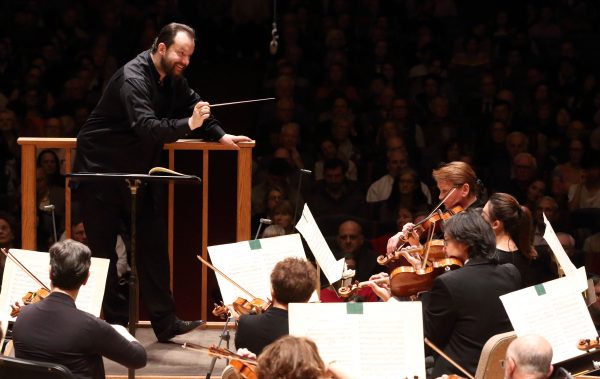Classical Music Review: Boston Symphony Orchestra plays Haydn, Turnage, and Elgar
As good an interpreter of large-scale forms as he’s becoming, Andris Nelsons has always been a terrific conductor of new music.

Andris Nelsons leading the BSO in Haydn, Turnage, and Elgar. Photo: Hilary Scott.
By Jonathan Blumhofer
A few days after wrapping up a conspicuously stirring series of Mahler Resurrection Symphony performances, Andris Nelsons and the Boston Symphony Orchestra (BSO) returned to action Thursday night with a London-centric program of music by Haydn, Elgar, and Mark-Anthony Turnage.(Program will be repeated tonight and on November 6.)
Interpretively, Nelsons and his band largely picked up where they left off last week.
An increasingly persuasive exponent of long-form narrative works, the conductor led a noble, pensive account of Elgar’s evergreen Enigma Variations to close Thursday’s concert, one that was highly organic, strongly lyrical, and steeped in nostalgia.
The score’s moments of mystery and intensity were impressively realized, especially the dark-hued string writing at the start of “R.P.A.” and the tense timpani/clarinet interludes in the penultimate “Romance.” “Nimrod” danced, its hushed opening building to a powerful climax, beautifully-blended and perfectly balanced.
At the same time, Nelsons’ reading lacked nothing for energy and character. The horn playing in “W.M.B.” blazed, the wet bulldog-depiction in “G.R.S.” overflowed with brio, and the finale — brilliant and exuberant — brought the whole piece to a rousing, cathartic conclusion.
A similar electricity marked conductor and orchestra’s performance of Turnage’s Remembering: In Memoriam Evan Scofield. A BSO co-commission that was written in 2015 as a memorial to longtime-Turnage collaborator John Scofield’s son, Evan (who died of cancer in 2013), Remembering is a symphony in all but name.
The first of its four movements opens with a series of swaggering riffs that are volleyed across the orchestra (which is wind- and percussion-heavy, and omits violins). Eventually, a dusky melody emerges from the violas, cellos, and horn, but the texture is almost always punchy: slashing, tightly motivic, and marked by glowering colors.
A wailing chorale begins the second movement. It’s followed by a soulful tune accompanied by Scotch snaps which collapses into a series of swirling figures that leads to a climactic reprise of the chorale.
The third movement is essentially a Scherzo filled with lots of boisterous gestures and culminating in a kind of cheeky waltz. Shadows intrude, though: at the center comes a big, wailing section over string tremolos and a steel drum (among other things); this theme returns near the end and leads to an abrupt coda.
Turnage based the finale on a short piano piece he wrote in memory of Evan Scofield, and it’s a correspondingly direct movement, at least in terms of form. Violas and cellos pass their thickly-scored parts back and forth; gradually the full orchestra joins in. After a potent apogee — one last, lamenting chorale and the violas playing the movement’s refrain in harmonics — the music fades away.
As good an interpreter of large-scale forms as he’s becoming, Nelsons has always been a terrific conductor of new music. He was again on Thursday, drawing playing of taut energy and brisk confidence from the BSO.
The orchestra’s brass and percussion sections, in particular, ate up Turnage’s blues- and jazz-inflected writing (think of as more abstruse Bernstein), playing the first and third movements with panache. Woodwinds, highlighted by Robert Sheena’s dulcet English horn, made the most of the bistred textures in the second movement. In the finale, principal viola Steven Ansell and principal cello Blaise Déjardin wove and exchanged their respective solos with melting fervor.
A dark, brooding — but not hopeless — piece, Remembering is among Turnage’s striking orchestral essays: concise and direct, it offers more textural and emotional variety than Speranza (the most recent piece of his the BSO’s done), while demonstrating a brilliant command of orchestral resources. The ensemble certainly seemed to enjoy it, giving the composer hearty applause when he came onstage to take his bows.
Before the Turnage came Haydn’s Symphony no. 93.
There were moments of real personality in Thursday’s performance of it: the Minuet drove vigorously, the second movement (with its elegant writing for string quartet at the start) was warm-toned and clean-textured, and the finale was marked by strong contrasts of dynamics and character.
Yet there was also tentativeness and some insecurity on display, too. The last movement’s flute and bassoon duets never quite fell into a groove and the first movement took a while to lift off — only to almost derail entirely around the exposition repeat. One got the sense that this staple might have benefited from a bit more rehearsal time.
Still, the overall impression of Nelsons’ Haydn intrigued. The conductor’s got an innate sense of the rhythmic energy that infuses Haydn’s style and clearly grasps the music’s wit. Maybe, instead of Beethoven or Brahms festivals, in some future season (or seasons) Nelsons will do an extended Haydn immersion: in these dark times especially, that might be beneficial for all of us.
Jonathan Blumhofer is a composer and violist who has been active in the greater Boston area since 2004. His music has received numerous awards and been performed by various ensembles, including the American Composers Orchestra, Kiev Philharmonic, Camerata Chicago, Xanthos Ensemble, and Juventas New Music Group. Since receiving his doctorate from Boston University in 2010, Jon has taught at Clark University, Worcester Polytechnic Institute, and online for the University of Phoenix, in addition to writing music criticism for the Worcester Telegram & Gazette.
Tagged: Andris Nelsons, Boston Symphony Orchestra
